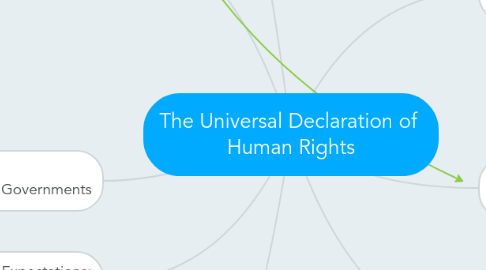
1. The US Upholding the Human Rights
1.1. The US making incremental progress in upholding the rights.
1.1.1. Solving problems of poverty
1.1.2. Making the Global Goals
1.1.3. Giving children education
1.2. There is still discrimination in the US
1.2.1. racism
1.2.2. judging other people's religion
2. Human Rights Violations
2.1. Not everyone has access to education
2.1.1. Around 72 million of kids are not in school + 759 millions of adults that are illiterate
2.1.2. Example of places that lack education : Sub-Saharan Africa, Central and Eastern Asia
2.2. There is still slavery in the world
2.2.1. Child labor
2.2.2. An estimated 35.8 million people are enslaved worldwide, according to a recent report by the Walk Free Foundation, a human rights organization.
2.3. Minimum wage of payment for workers
2.3.1. Article 23 of the Declaration of Human Rights: Everyone, without any discrimination, has the right to equal pay for equal work.
2.3.1.1. Lowest minimum wage recorded is in Mexico were the minimum wage is $1.01
2.3.1.2. Capitolism
2.3.1.2.1. The rich population are getting richer and the poor are getting poorer. The gap between the two populations are increasing.
2.4. Information from: http://www.businessinsider.com/minimum-wage-around-the-world-2015-5 and http://www.humanium.org/en/world/right-to-education/
3. Democratic and Non-Democratic Governments
3.1. The ideas in the human rights favor the democratic government,
3.1.1. Supporting the needs of the people
4. Real World Expectations: Realistic or Implausible.
4.1. Progress can be made, as it has in many countries.
4.1.1. Education is being given
4.1.2. Working to solve poverty
5. Necessary Articles in the Declaration of Human Rights
5.1. The rights that prevent slavery
5.1.1. Article 4: No one shall be held in slavery or servitude; slavery and the slave trade shall be prohibited in all their forms.
5.1.2. Article 5: No one shall be subjected to torture or to cruel, inhuman or degrading treatment or punishment.
5.2. The rights that give equal protection to everyone
5.2.1. Article 7: All are equal before the law and are entitled without any discrimination to equal protection of the law. All are entitled to equal protection against any discrimination in violation of this Declaration and against any incitement to such discrimination.
5.2.2. Article 14 :(1) Everyone has the right to seek and to enjoy in other countries asylum from persecution. (2) This right may not be invoked in the case of prosecutions genuinely arising from non-political crimes or from acts contrary to the purposes and principles of the United Nations.
5.3. The rights that allow people to express themselves without any interference.
5.3.1. Article 18: Everyone has the right to freedom of thought, conscience and religion; this right includes freedom to change his religion or belief, and freedom, either alone or in community with others and in public or private, to manifest his religion or belief in teaching, practice, worship and observance.
5.3.2. Article 19- Everyone has the right to freedom of opinion and expression; this right includes freedom to hold opinions without interference and to seek, receive and impart information and ideas through any media and regardless of frontiers.
6. Importance of the Universal Declaration of Human Rights
6.1. Raises the awareness of the rights that humans should have.
6.2. Does not have full influence on the whole world since the rights are being violated in many countries.
6.3. People are stepping up to accomplish the rights and are being connected to each other from this common goal.
7. Protecting the Human Rights
7.1. People can bring to attention the violations of the rights in countries.
7.1.1. Organizations
7.1.2. Speeches
7.1.3. Public events
7.2. People can work to fulfill the human rights.
7.2.1. Working to give everyone education
7.2.2. Helping those in need and those who are in poverty.

